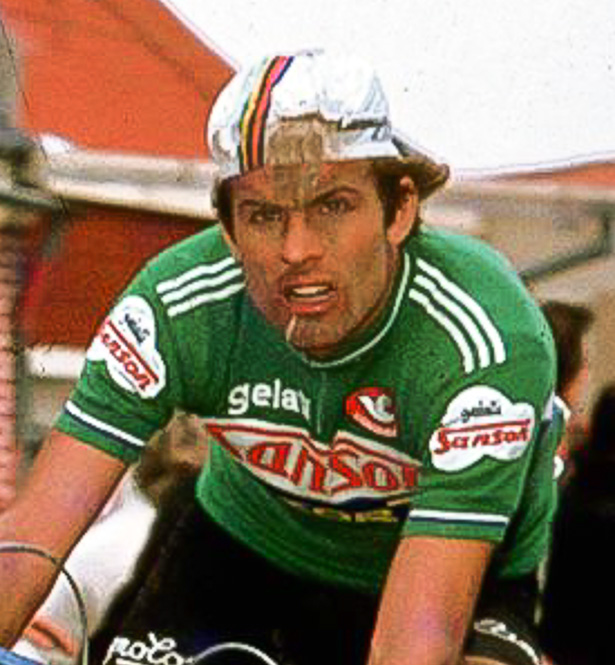
He looked super cool on a Fred Baker with a Western Road Club jersey on his back; plonk him atop a silver all-Campag Benotto clad in Sanson strip – complete with crumpled Oppy cap at just the right angle – and well, you were into the Simpson/Ocana/Merckx zone on the CooloMeter.
Phil Edwards is that man; omnipresent on the GB amateur scene when I was a schoolboy, he piled up the wins then headed to Italy, made a name for himself in the savage amateur scene there before stepping smoothly up into the glamorous but cutthroat Italian professional world.
But not just with any old team – Sanson, the ice cream company sponsored squadra (even the sponsor’s product was cool) of Italian Capo, Francesco Moser.
And not just as any old gregario but as Capo Cecco’s right hand man.
We’d been keen to catch up with the big former British Junior Road Race Champion from Bristol for some time and thanks to the good offices of cycling journo and author Herbie Sykes, the connection was made.
Edwards owns a restaurant now, in the south of France and here’s what he had to say to VeloVeritas about those Golden Days back in the 70’s – and despite all those years in Italy and now France he still retains that distinctive but not unpleasant Bristol ‘burr.’
You came out of a good scene in the South West in the 60’s and 70’s Phil, didn’t you?
“Yeah, the Bristol scene was strong with guys like Graham Moore, my friend, the late Dari Kasprowicz, Gary Crewe and the likes of Brian Sandy and Colin Lewis not so far away – all good riders.”
You won just about everything there was to win in GB…
“Many of the races have gone now but they were big back then – the GP of Essex, the Greenall Whitley stage race, the Lincoln GP, the Tour of the Cotswolds…”
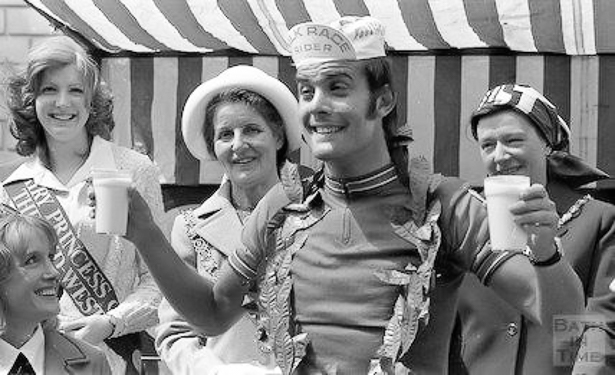
And I make it three Milk Race stages and two prologue wins?
“I won the prologues in Brighton and Plymouth with the stage wins coming in Nottingham – that was probably my best win; Cardiff, where I outsprinted Kuiper and in Bath.
“In those days you were up against the East Germans and the Poles with guys like Ryszard Szurkowski and Stanislaw Szozda who were all really professional in their approach to the sport – we were all still real amateurs in the UK.
“Then there were real quality guys like the late Fedor Den Hertog from the Netherlands and the Czech Jiri Mainus. It was the race of the year for British riders in the 60’s and 70’s – a very hard percorso with those Welsh Mountains and riding through freezing cold fords across rivers.
“It was also the scene of the first proper US forays into European racing.”
You raced in The Netherlands in 1969 and 1970?
“In 1969 I won the Frank Southall scholarship which enabled me to race over there. I stayed with Charles Ruys, who was a Six Day race promoter, near Rotterdam. It was a real eye opener with the echelon riding and the professional way the amateurs approached the sport.
“The first year I rode a lot of 100 kilometre criteriums; there was another English guy racing out there at the time, Morgan Jackson – we were riding against guys like Tino Tabak, Rene Pijnen and the late Bert Oosterbosch.
“The second year I was with a team for six months but I came back to England for ’71 and ’72; you have to remember that for a Bristol boy to get to the Olympics back then was a big deal – and that was the focus.”
The GB mentality was truly ‘amateur’ back then, wasn’t it?
“In those days, if I was riding for GB in Europe I had to get the train from Bristol to Paddington; I had my good wheels on sprint carriers on the front forks and my bag on my handlebars.
“Then from Paddington we’d get the boat train – the BCF had no money; I remember riding a youth tour in Cologne in 1967 and getting on the boat train to go to Germany.
“It was only when I was older and riding well and getting invites to races in Germany that I received air tickets from the organisers.”
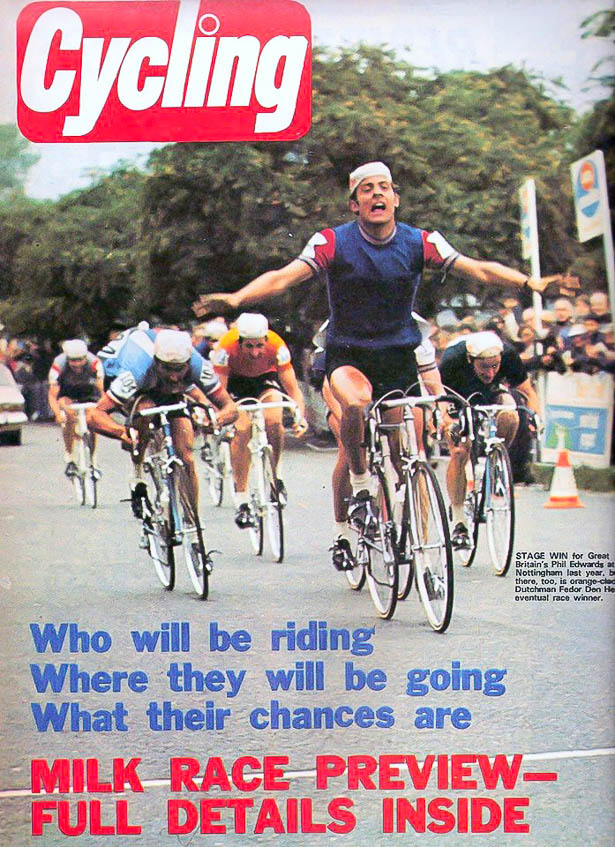
Did you ever consider the GB professional scene?
“The ’72 Olympics were the big thing and you had to be amateur; Cav can ride the Commonwealth Games, the Olympics – but not back then.
“I knew a lot of the professionals of the time; Gary Crewe, Graham Moore, Colin Lewis – I was in contact with them all the time.
“The late Barry Brandon wanted me for his Bantel team and the late Roy Thame offered me place with Holdsworth-Campagnolo but I’d tasted the European scene and knew that GB criterium racing wasn’t what I wanted.”
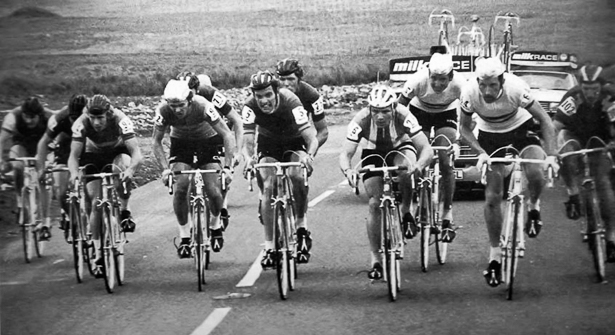
Tell us about the ’72 Olympics…
“I remember the day the terrorists struck so vividly; those poor Israeli guys were murdered just a couple of hundred yards from where we were staying.
“The Olympic Road race was a very fast one which Hennie Kuiper of the Netherlands won on his own. Clyde Sefton was second for Australia but the guys who was third – Huelamo of Spain – was declassed for failing a drugs test.
“Bruce Biddle the New Zealander was fourth but they didn’t move him up to bronze because they hadn’t tested him.
“Phil Bayton was fifth and I was sixth – but really we were fourth and fifth. Francesco Moser was seventh, so I had a good ride.
“I ended that year with two second places on stages in the Tour de l’Avenir and ninth overall on GC; Den Hertog won pverall, Battaglin was eighth and Kuiper tenth.”
Then it was Italy for 1973?
“With GS Leone, yes; I went out with my mother, who’s Italian, in the winter after she’d contacted Ernesto Colnago about getting me a ride.
“They knew of my performances in the Olympics and l’Avenir so I got the place – they expected me to be a good athlete but it was hard to start with.
“There was a lot of climbing in Tuscany and the races were run when the days were at their hottest with temperatures in the 90’s.
“That first season I developed bronchitis then came home for the Milk Race but when I went back after that I was winning.
“The following year I was competitive and by 1975 I was winning good races.”
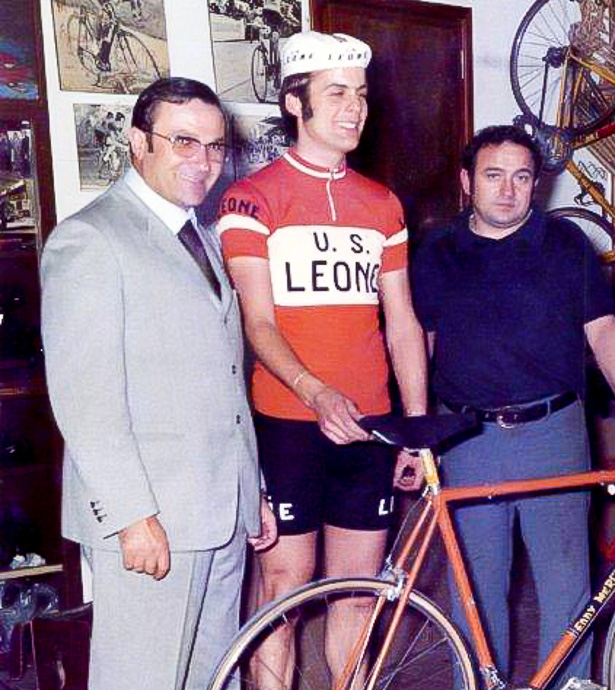
But it must have been pretty competitive to get a pro contract with all the Italians fighting for places?
“The Filotex team was based in Tuscany and they’d take foreigners, guys like the Dane, Ritter and the Swiss, Fuchs – and I had the performances and could sprint.
“My manager, Roberto Ballini had been a pro with Filotex, Max Meyer, GBC, Dreher and Ferretti so he was well connected and got me the ride with Sanson for ’76. Moser had been with Filotex in ’75 but the Sanson team was built around him for ’76.
“I was with him for five seasons with 1977 my best year – but all my seasons were good.
“My main roles was as Moser’s gregario but I still had some good results in my own right; like second to Saronni in the ’77 Tre Valli Varesine and he also beat me for the win in the GP Citta di Camaiore in ’79.”
It was a long season then…
“I raced from mid-February until the Tour of Lombardy in October; riding all the Classics – Wevelgem, Roubaix, Liege then with a big focus on the Giro.
“Moser didn’t ride the Tour de France, Sanson had no commercial interest in it so I’d get a summer break – but with me being a friend of Moser’s I got rides with him in the post-tour criteriums.
“I had offers from other teams but I knew where I fitted in to the way of things.”
If you could, would you have changed anything?
“Looking back I should have gone to Italy when I was 21/22 years-old, not 26 and I shouldn’t have ridden all those national tours I did for GB as an amateur – from Algeria to Switzerland – too many.
“It was a hard school back then, not one neo-pro could win a race; you were up against the likes of Maertens and De Vlaeminck – men with big egos.
“If you were a gregario back then there was a lot of pushing and shoving for position involved – but it’s like watching soccer, it’s developed, so different now to how it was back in those days.”
Check out Part Two of our exclusive Phil Edwards interview.



